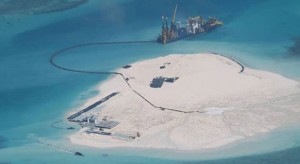
Johnson Reef, called Mabini by the Philippines, at the Spratly Islands in the West Philippine Sea. AP FILE PHOTO
MANILA, Philippines — The Philippine president said Wednesday that the international arbitration Manila has initiated to challenge China’s territorial claims in the South China Sea and a legally binding “Code of Conduct” are the only ways to settle the long-raging disputes peacefully.
The Philippines says that China has been intruding into its exclusive economic zone, including deploying two hydrographic ships in June near an offshore oil well inside Philippine waters. Philippine President Benigno Aquino III has said Manila is uncertain of the purpose of the ships’ presence at the Reed Bank.
Aquino said Wednesday that Chinese reclaimed land in the disputed waters, if used militarily, could be a “game changer” in the future settlement of the dispute.
Countries in the region and those that use the busy sea lanes that straddle the South China Sea and the disputed Spratly island chain are concerned that the conflict could erupt into violent clashes.
Speaking at a forum with foreign correspondents, Aquino said the Philippines is seeking an internationally recognized settlement of the disputes. “This affects not just countries in the region, but countries that have to traverse this particular ocean,” he said.
Manila has filed a case with an international tribunal in The Hague challenging China’s territorial claims over most of the South China Sea, but Beijing has refused to take part. The Philippines and some other countries in the 10-member Association of Southeast Asian Nations, or Asean, are pushing for the approval of a legally binding Code of Conduct to replace the non-binding 2002 Declaration of Conduct of Parties in the South China Sea.
“Beyond that, I don’t know what else we could do,” Aquino said. “The focus is to achieve a solution through peaceful means bound by international law.”
China has said that the Philippines’ filing of the case could damage relations between the two countries and that it would prefer to settle the dispute bilaterally.
Aquino said Chinese actions in the South China Sea were “not in conformity” with the 2002 agreement signed by Beijing and Asean calling on all claimants over parts or the whole of the regional waters not to exacerbate their dispute.
“We have issues about the reclamations, about rocks, in so far as rocks being turned into islands,” he said, referring to Chinese land reclamations in at least three shoals claimed by both China and the Philippines.
“Is it a game changer? Obviously it’s a game changer,” he said in response to a question on whether the reclaimed land could be used to install military facilities such as an airstrip, posing a security threat to the Philippines.
China’s conflicts with Vietnam and the Philippines have been intensifying over the past two years. The most serious confrontation was in May between Chinese and Vietnamese ships near an oil rig deployed by Beijing in waters claimed by Hanoi.
Aside from China, the Philippines and Vietnam, Taiwan, Malaysia and Brunei also have claims in the South China Sea.
RELATED STORIES
PH case vs China a model for int’l sea disputes
China wants PH to drop arbitration case to heal diplomatic wounds

